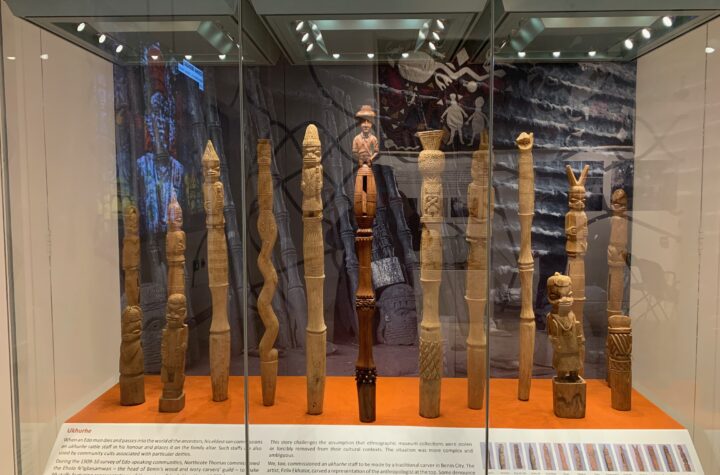
I went to see the ‘[Re:]Entanglements’ exhibition at MAA in Cambridge before it closed in April 2022. Like my work, the project was concerned with an ethnographic photographic archive. While I have wondered whether the Powell-Cottons photographs of people can be divorced from their colonial origins, I was struck that this display speaks of re-entangling rather than detangling objects from their problematic histories.
The focus of the exhibition was almost entirely on Northcote Thomas and his lens. There is even a life-size cut-out of him behind a camera, as if he is taking a photograph of the museum audience…I didn’t get what this was supposed to achieve). Elsewhere in the space there are objects that have been created, by Nigerian and Sierra Leonian artists, as tributes to Northcote Thomas. Some specifically commissioned (a staff) some where the artist presumably had more agency in how they depicted him. But one interesting depiction, reimagining a wrestling match that he filmed as a wrestle between colonial and African power is tucked away behind the works of him reimagined as a deity.

On one wall there are rows of type photographs, surrounding a film in which contemporary interviewees are framed as a mirror image of the types. To the right of that there is a panel that I had to look at twice before I realised that it included the names of the people depicted in the photographs (which are missing in the larger installation on the wall).
Some of the artworks by West African artists were actually really striking and interesting but I found there was not enough information about them. On of the biggest displays was a recreation of one of Thomas’s photography set ups, but in front of a commissioned textile instead of a canvas background.

Another film was billed as five imagined monologues (except on closer inspection of the website one is actually a speech by the son of a chief that Thomas made a written record of). One was an adult woman playing a child with exaggerated wonder (‘Have you seen the Oyinbo…his skin is like milk’). One was a wooden idol. One was John, Thomas’s assistant, talking about how proud he was of holding the umbrella and assisting him taking his photographs. About how he heard Thomas say he was the ‘most capable boy he had ever had’, again with pride. This makes me think of Powell-Cotton’s comments about his staff – so dismissive, insulting, apart from the odd exception, the one Somali man he praises. I can’t read this kind of praise from a colonial official as completely sincere, or without patronisation. I can’t imagine someone taking this comment at face value, without considering the implication that all the other ‘boys’ are incapable.
It made me think of Washington Black, a novel about a young enslaved man who becomes the assistant to a naturalist and inventor. I thought the author, Esi Edugyan, created a more nuanced interior world for her character. Washington’s pride at being chosen to perform skilled tasks is ultimately weighed down by the sadness of his understanding that he was not selected for his talent or potential but, initially, for his physicality.
Of course we bring our own perspectives to these imagined stories, thinking about how we would react to performing such a job. It makes me wonder whether Paul Basu, the curator of this exhibition, or Usifu Jalloh, his collaborator on these scripts, have held such a role. Perhaps he has had the role of assisting an anthropologist as a young student trainee, but what about having the kind of job where you do what you are told, you have no agency, you have no stake in the results of the work. That is how I imagine Powell-Cotton’s assistants felt. Not because I cannot imagine them having pride in their work, but because the tone of Powell-Cotton’s writing, and the photographic evidence, suggests that they were overburdened, and viewed with contempt by their employer.
I left the exhibition feeling that the artistic interventions, from these monologues to the commissioned works depicting Thomas, romanticised Thomas and the figure of the colonial anthropologist in a way that I was not expecting. Re-entangled indeed.